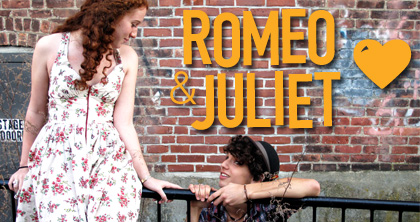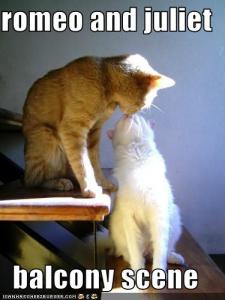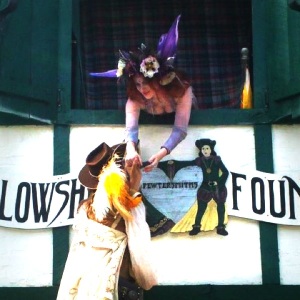This weekend past, I had the good fortune to see three shows over the course of four nights.
Since I’m currently in conference-prep mode, I don’t have the time or sanity to do a full review of each of them, but I would like to say a little something about all of them. So here’s the weekend in reviews!
Macbeth
Performed by Theater906 at Emerson Umbrella Center for the Arts
Directed by Emily C.A. Snyder
For all intents and purposes, this was community theatre Shakespeare. Now I’ve had some bad experiences with CTS, and some good ones… and I’m sorry to say that this show simply did not deliver. It had potential; its primary focus was upon the idea of “castles built on sand”. It was set on the seaside at some point between the world wars, and the title character’s hands (once steeped in blood) never washed clean.
There were a few major flaws with the production: 1) it treated its audience like idiots. I don’t have a problem with “new” and “different” readings of these plays if they are firmly

The set for MacB. Pretty nice as sets go!
grounded in text and well dramaturged, I don’t even have a problem with a bit of textual manipulation, but if you’re going to do it trust your audience to follow along with you. The conceit of “sand castles” was written into the program, presented in all the advertising material, and shown out in front of the theatre. You don’t need to beat us over the head with it in an artsier-than-thou montage during the curtain call. Have a little faith in the people who see your show. 2) There were some big, bold ideas that were presented in the performance (i.e. Duncan as an angel of death figure who came and retrieved the corpses of the dead, Lady M’s obsession with children, violence violence violence intersecting innocence), but they simply weren’t played ENOUGH. If you’re going to do something big, go big or go home. If you do it too small, your audience simply won’t follow you. Because the director refused to commit to her grand choices, they simply read as half-hearted attempts to connect with a concept that wasn’t fully fleshed out. 3) Macbeth should never be played as Hamlet. Yes, he runs mad. Yes, his wife goes bonkers. But Macbeth’s madness is a different madness than Hamlet’s. It’s not as weak and bumbling, it has an innate strength and danger to it. I don’t want to see the King of Scotland writhing on the floor because he killed one man. Remember: MacB is a SOLDIER. He’s killed before. It’s not the act of murder that takes his sanity from him, but rather the sense of divine wrongness in the act of defying natural order.
On the whole, give this one a miss… unless you really feel like you need to get some wear out of your black beret and sunglasses.
Twelfth Night
Performed by the Rhode Island Shakespeare Theatre at Roots Café in Providence
Directed by Bob Colonna
My love for TRIST and Bob Colonna is no secret. THIS is the kind of Community Theatre Shakespeare that gives me hope for humanity.
Colonna is masterful at taking a cast of amateur and quasi-professional actors and building them into an unstoppable force of Bardery. In his Twelfth Night, he cut the text down to two hours, pumped up the volume, and created a rip-roaring evening of vaudevillian hilarity which had us grinning ear to ear. Colonna’s actors don’t miss a beat, and are simply unstoppable in their boundless amounts of energy and enthusiasm.

Malvolio (front) reads the letter egged on by Sir Andrew, Fabiana, Sir Toby, and Maria
Moreover, Colonna’s textual coaching is unbeatable. His actors punch the punches with enough force to leave you reeling. They hit every note (in the case of his Feste with an astounding amount of beauty and power) and aren’t afraid to do things a little differently (doubtless this is a result of Colonna’s creativity with the text and direction).
Side-note: you can always tell when an actor is rehearsing for Sir Andrew Aguecheek because he runs around trying to figure out how to do the “backtrick”. Someday I want to see someone out with a full back tuck handspring combination…
Unfortunately, I got to this show late in its run so you won’t be able to catch it. However. Colonna has promised me that he’s directing As you Like it to perform in June at Roger Williams memorial park. I will post further details as soon as I know them… but when I do take my word on this: GO. If you have to steal your neighbor’s donkey and abscond with the rent money to get to Providence, find a way to make it work. Trust me; it will be worth it.
Romeo and Juliet
Performed by the Stoneham Theatre Company at the Stoneham Theatre
Directed by Weylin Symes
Yea, I know. How many Romeo and Juliets can one person see in her lifetime? This one  was new and different because Stomeham coupled their adult company with their teen company so the adults played adults and the teens played teens.
was new and different because Stomeham coupled their adult company with their teen company so the adults played adults and the teens played teens.
As you can imagine, this presents a bit of a problem in terms of sheer experience. Shakespeare is notoriously complex textually and, while I have seen transcendent teen Shakespeare, it is extremely rare. To pull it off you need a creative director, a kick-ass text coach, and more than a little bit of luck.
Unfortunately, this production fell short on a few of those items. While the teens did okay, there was an obvious discrepancy between their ability to speak and that of their older colleagues. Moreover, the text was poorly cut. Many bits of this play simply don’t read to a modern audience – the nurse’s long monologues at the beginning, the Queen Mab speech (unless you’re Michael Pennington, but really, who is?)… it needs some careful handling to really plow forward in a way that doesn’t lose its audience. Unfortunately, whomever handled the text for Stoneham didn’t have a very deft hand with this. The long bits were long and plodding, and important plot points (i.e. the friar’s letter going astray due to plague) were cut completely.
An old friend of mine (a fight director) held an axiom which I think is vital to dealing with a text as iconic as Romeo. Here’s the problem: how often has your entire audience heard these things? How can you even begin to think about putting your mouth around the words “But soft, what light through yonder window breaks?” without thinking about ALL THE OTHER FAMOUS ACTORS WHO HAVE DONE SO IN THE PAST. It’s a Harold-Bloom-esque conundrum that plagues the modern actor about to set into any iconic role (Richard Plantagenet “now is the winter of our discontent made glorious summer by this son of York…”; Hamlet “To be, or not to be? That is the question”; The Witches “Double, double, toil and trouble, fire burn and cauldron bubble!”; etc…). So here’s what you have to do: you have to assume that there is at least one person in that audience who has never had any contact with the text before and doesn’t know how the play ends. You have to play to that person. You have to craft a performance so that that person understands your story without any prior knowledge of what may be going on.
This play failed to do so. They leaned too much upon the cultural capitol which they were mining to put butts in seats and, in doing so, did their entire production a disservice.
The fight direction, on the other hand, was downright amazing and some of the best violence I’ve seen onstage in a long time. Bravo for that.
On the whole, it was a thought-provoking weekend. Now here I go, back to conference prep mode; dive! DIVE!


 same time. After all, the last time I had worked on monologues I was firmly within the “mistress” range edging into too young for those… the last time I worked on monologues I was playing Phoebe and Julia, La Pucelle and Marianna, young women. Lady Percy? A widow (albeit before her time)? My nineteen-year-old self couldn’t do it…. But my twenty-four-soon-to-be-twenty-five-year-old self? Can I really play Lady Percy?
same time. After all, the last time I had worked on monologues I was firmly within the “mistress” range edging into too young for those… the last time I worked on monologues I was playing Phoebe and Julia, La Pucelle and Marianna, young women. Lady Percy? A widow (albeit before her time)? My nineteen-year-old self couldn’t do it…. But my twenty-four-soon-to-be-twenty-five-year-old self? Can I really play Lady Percy?
